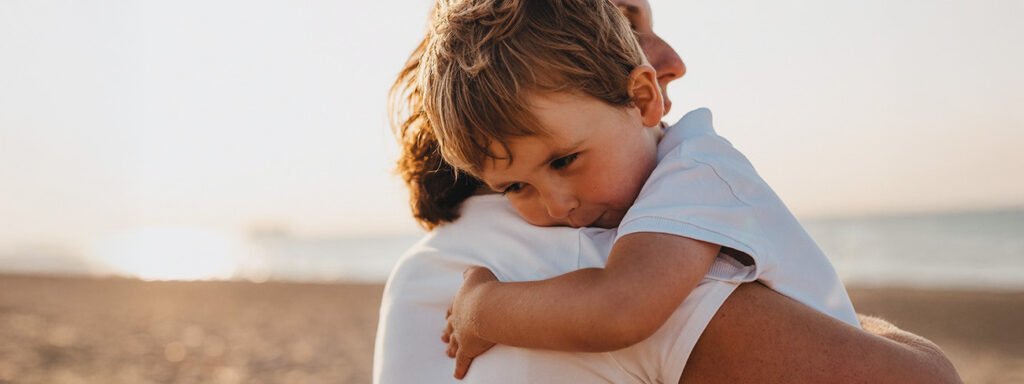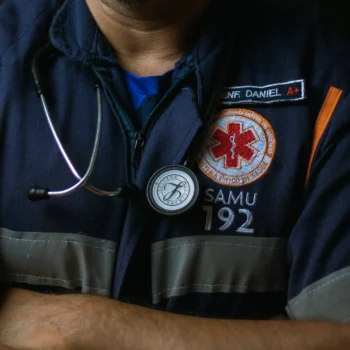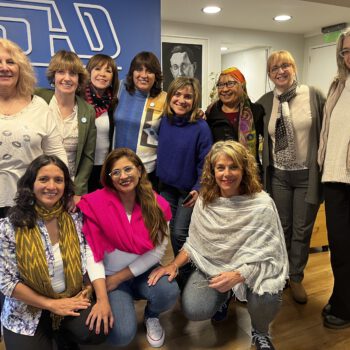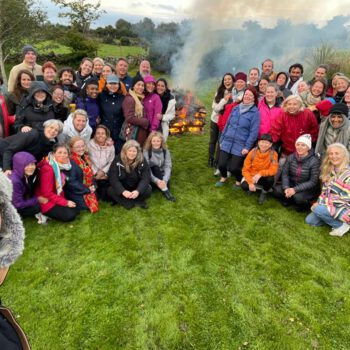In 2011, after experiencing burnout, Andrea began studying childhood trauma, stress patterns, Compassionate Inquiry®, Systemic Coaching and Family Constellations, Mindfulness-Based Cognitive Therapy, Yin Yoga, Stress Management Coaching, Psychosocial Counseling, and other approaches that integrate the mind, body, and emotional healing. Today she creates safe spaces for people to connect with their inner truths, release limiting beliefs, and embrace their authenticity.
This short edited excerpt of Andrea’s interview follows her journey from international moves to abandonment to daily life with family addictions. Listen to her full interview on The Gifts of Trauma.

Secrecy and denial are typical in families where a spouse, sibling, parent or child is experiencing addiction. I chose to share my experiences with multigenerational addiction as there was a layer of shame around it that I wasn’t aware of for a very long time. Secrecy influenced how I stood in the world. Shame was its foundation. Now that I can see the secrecy and shame and recognize how much pain they caused, I really want to give voice to this.
As a second generation immigrant, I spent years searching for my place in the world. I was born in Barcelona in 1976, at the end of Franco’s rule. My father was Argentinian and my mother was from Chile. They were very young when they came to Spain, part of a wave of refugees escaping South American dictators. Unfortunately, a lot of monsters followed them. We lived in communities of refugees, artists, philosophers and poets who created, lived and worked together. I grew up with all of them. It was normal for me to be with musicians in jam sessions and rehearsals, or artists, in this big community of underdogs from all over the world.
My parents separated when I was very young, and we moved around a lot. My mother was a very charismatic woman, but when she fell into a heroin addiction, she often couldn’t take care of me. I was left with one person or with another, semi-abandoned. When I was five, she sent me on a plane, on my own, to my aunt in South America who I didn’t know. But my mother also gave me a beautiful sister, and an incredible family in Chile, whom I love and I am grateful for them all.
My father was a musician and tango singer; a very kind, funny man. He showed me a lot of love but he didn’t know how to manage his life, so he didn’t give me a sense of protection. I’m really thankful that he gave me two amazing brothers whom I love like crazy. He also gave me great humor, good morality and ethics, and I appreciate all of that.
When I was young I fell in love with a Dutch artist-actor-musician, and moved to Amsterdam. There were many writers, musicians and creatives in there, which felt familiar, and that was where we lived. I never thought of myself as creative, but I understand the process of creativity very deeply.
Some years later, I met the father of my son. It turned out that he too had trouble with addictions, so we separated pretty early. He’s still struggling, so I’ve been a sole caretaker, a single mom. I also provide for my son and am committed that he won’t lack what I did, as a child. In Amsterdam, I have no family members to help me, so… I had to do it on my own. That was my truth and my belief. So I worked crazy hours and held it all together until I burned out. Then my whole fairy tale fell down.
Surprisingly, this turned out to be the best thing that could have happened. Burnout made me stop. It made me aware of my body, which was previously just my built-in transportation. The big panic attacks that came with burnout forced me to figure out how to get my body to respond, as I had to take care of my child.
I was always moving. When I was in my early 20s, I counted that I had moved schools, homes, countries and cities fifteen times. I had to keep on running until I found my place. Not belonging is a very old core belief, as my mother thought she should have aborted me. So my core belief was: ‘I don’t belong in this world.’ I didn’t know how big or how deep that was, so I tried to adapt to every place I lived. I learned to speak Spanish with an Argentinian accent, a Chilean accent and the accent of Spain, to blend in as well as possible, so they would not think that I didn’t belong there.
I remember going out with friends. I didn’t need to use drugs or alcohol. I was just able to act as they were, like a sponge that absorbed their presence and didn’t need to take anything.
Becoming a chameleon was my adaptation, and I lost my true self in that process. So I began my healing journey to come home to myself, my roots and wholeness. When I gained self-awareness, through Compassionate Inquiry®, I realized that this community was my home. Sat Dharam said, “We heal in community.” I completely agree, as it was here that I gained deep self-awareness and the ability to be with whatever came up, like the shame I had carried for so long. Here, I finally understood myself, made peace with my family and the addictions. That was a huge shift, because before, I didn’t want to know anything about my family’s addictions. Upon realizing they’re definitely in me too, I was able to open up to belonging. I always believed I didn’t belong, as I’m from all over and nowhere. I don’t belong with the creatives, but I do. I don’t belong in this country, but I do. That was the whole opening up part, as all the countries I have blood from, and all of the people I share blood with, are my roots. All the traumas are my roots as well.
Today, as my son struggles with his own addiction, I realize that he experienced a lot of really painful things. I spent too many years working crazy hours so we could survive. His father has big addiction and substance problems. Compassionate Inquiry® gave me the space to not run away from addictions and people experiencing addictions. Always, something in my life reflects to me that I can do something about it. I’m extremely grateful that I have that understanding now, and that I understand where both my son and I are coming from so I can recreate our relationship.
The Gifts of Trauma is a weekly podcast that features personal stories of trauma, transformation, healing, and the gifts revealed on the path to authenticity. Listen to the interview, and if you like it, please subscribe, leave a rating or review, and share it with others in your community.



